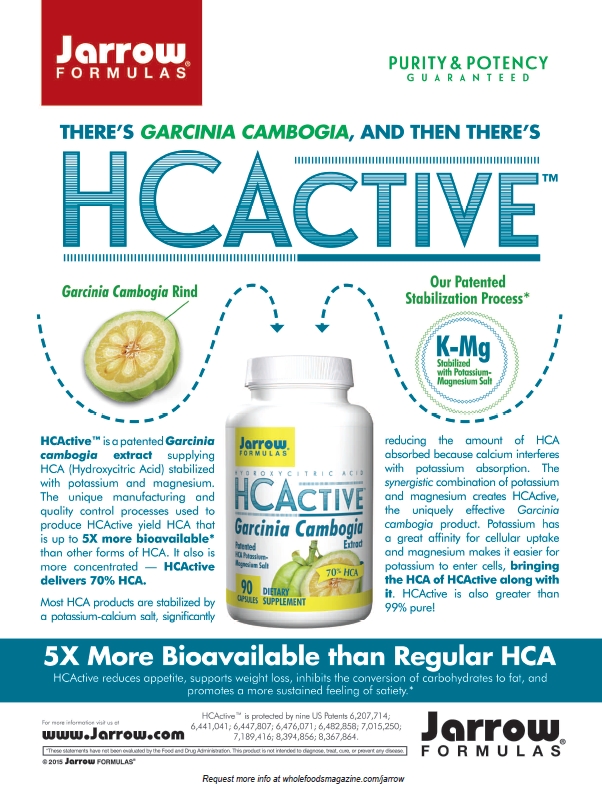Many consumers want to live a healthier lifestyle, and one of the most common reasons for doing so is weight management. Weight management is a big sales draw for multiple sectors, with revenues totaling $61 billion in 2013 (1). This number encompasses several categories, from services to programs to drugs, and dietary supplements are no exception. While several natural ingredients have been touted as valuable for weight management, there is also some skepticism surrounding them. With this said, scientific interest and study on these ingredients suggests that there may be more at work than just trends.
Garcinia cambogia
A fruit traditionally eaten in India and China for centuries, Garcinia cambogia’s claim to fame is hydroxycitric acid (HCA), which makes up about 20–30% of its rind and generally 50–60% or more of the extracts commonly used in dietary supplements (2). HCA is said to have many beneficial properties, including acting as a thermogenic, supporting a healthy appetite and even benefitting one’s mood by raising levels of serotonin in some cases (3). These purported properties have made Garcinia cambogia one of the most popular choices in natural weight management.
As a result of its popularity, Garcinia cambogia is also one of the most researched natural weight management ingredients, and the majority of findings are positive. One review of several individual clinical trials using Garcinia cambogia ultimately concluded that it offered weight-loss benefits in the short-term (4).
also one of the most researched natural weight management ingredients, and the majority of findings are positive. One review of several individual clinical trials using Garcinia cambogia ultimately concluded that it offered weight-loss benefits in the short-term (4).
While this particular review shows more modest weight loss overall, other studies have shown more pronounced results. One study taking place over a 16-week period included 44 adults ages 20–65 with a visceral fat area over 90 cm², who supplemented with Garcinia containing 1,000 mg of HCA daily. At the study’s conclusion, the Garcinia group showed significantly reduced visceral, subcutaneous and total fat areas compared with the placebo group. In addition, no “rebound effect” was noted during weeks 12–16, a fact of great importance to consumers looking for long-term weight solutions (5). There has also been some concern as to side effects of this supplement, primarily digestive issues, so one study was undertaken that was specifically geared to gauge the safety of Garcinia. In the end, researchers found no major side effects in either human or animal trials (6).
One other aspect to the garcinia question that may be overlooked is the fact that different derivatives of the fruit may yield different results. One branded supplement using a calcium-potassium salt of HCA (Super CitriMax from Interhealth, also known as HCA-SX) was tested for applications in weight management and overall safety in 60 human volunteers over the course of a five-week study. Subjects were given a 2,000 kcal diet per day, participated in a 30 minute walking exercise program 5 days per week and given an oral dose of placebo or 4666.7 mg HCA-SX (providing 2,800 mg HCA) in three equally divided doses 30-60 min before meals. At baseline, four and eight weeks of treatment, several metrics including BMI, body weight, and serotonin were taken. At the conclusion of the study, body weight and BMI decreased by 5.4% and 5.2%, respectively. Significant reductions in food intake, total cholesterol, LDL, triglycerides and serum leptin levels were also recorded, along with increases in HDL and serotonin. No adverse effects were recorded in this study or a companion study testing for similar effects in rats. (7)
Green Tea Extract
Green tea has been praised as a healthy beverage for quite some time, but recent developments have shown it may also be of value in supplement form to those seeking help with managing weight. The active components that are focused on in the weight management discussion are catechins and caffeine, both of which are believed to help play a role in increasing energy metabolism, which leads to weight loss.
In one review of studies, data were collected from several randomly controlled trials in which obese and overweight adults supplemented with green tea. All these studies took place over 12 weeks at minimum, with 1,945 total participants recorded in the review. The review noted that there was an overall trend in weight loss over the various studies, but there was some question whether the weight loss was statistically significant in terms of actual pounds lost or in other ways used to measure weight like waist circumference or BMI index. While some effects like nausea and abdominal discomfort were recorded, none of them were believed to be related to the tea (8).
Another study focusing on green tea catechins specifically has yielded even more promising results. In this study, 20 healthy overweight and obese men supplemented with 300-mg doses of the green tea catechin epigallocatechin-3-gallate over three days. At the study’s conclusion, postprandial fat oxidation increased by 33% in the green tea group over placebo, similar to results of a previous test that used 200 mg of caffeine. A subsequent test combining the catechins with caffeine increased postprandial fat oxidation by 49.4%, and the study authors concluded that this particular catechin could be of value to the overweight and obese (9).
CLA
While the idea of fighting fat with fat may sound a bit strange, there is some scientific evidence that suggests conjugated linoleic acid (CLA) may be valuable in the weight management area. A mixture of isomers of linoleic acid, CLA can be found in several meat and dairy products. However, supplements are currently the only practical sources to get significant quantities of CLA (10). Part of what has generated interest in CLA are initial animal trials, where results like mice losing up to 60% of their body fat were discovered, as well as potential applications for immune support. In humans, while results have been positive, it is not nearly to that extreme.
 One meta-analysis on CLA weight loss research covered 18 randomized, double-blinded, placebo-controlled trials in which CLA supplements were used. Subjects across the studies included both overweight/obese as well as non-obese people. One study even used resistance-trained men, in response to the idea that CLA can help build muscle along with reducing fat. After averaging the results together, the research showed that people who took CLA supplements daily lost an average of 0.09 kilograms a week. While this result may not seem like much, the authors point out that this is larger than and in opposition to the average weight trends for Americans, which is currently a gain of 0.009 kilograms a week. Overall, while the study concluded that weight loss from CLA supplementation was “modest,” researchers acknowledged that in an environment where consistent weight gain is the norm, CLA could be useful over time (11).
One meta-analysis on CLA weight loss research covered 18 randomized, double-blinded, placebo-controlled trials in which CLA supplements were used. Subjects across the studies included both overweight/obese as well as non-obese people. One study even used resistance-trained men, in response to the idea that CLA can help build muscle along with reducing fat. After averaging the results together, the research showed that people who took CLA supplements daily lost an average of 0.09 kilograms a week. While this result may not seem like much, the authors point out that this is larger than and in opposition to the average weight trends for Americans, which is currently a gain of 0.009 kilograms a week. Overall, while the study concluded that weight loss from CLA supplementation was “modest,” researchers acknowledged that in an environment where consistent weight gain is the norm, CLA could be useful over time (11).
Other individual studies also have discovered potential benefits to using CLA. One unique study targeted weight gain in the holiday season, with 49 overweight but healthy individuals taking 3.2 g CLA daily or a placebo over a six-month period including the pre-holiday period (August-October) and holiday season (November–December). At the conclusion of the study, the CLA group had lost a kilogram of body fat compared to the placebo group, and also reported decreased negative emotion compared to the baseline. In contrast, the placebo group experienced significant weight gain over the holiday months compared to CLA (12).
However, it must be acknowledged that there are some potential health concerns with CLA as well. While it is a generally safe nutritional substance, some further studies into its applications for diabetic health showed that it could possibly worsen blood sugar control in people with diabetes, as well as decrease insulin sensitivity in overweight people. While a subsequent study using the most precise method of measuring insulin sensitivity available failed to find any harmful effects and some studies showed it reduced blood sugar levels, those with diabetes or at risk of it should not use CLA without a physician’s supervision (10).
Capsaicin
Known by many as the ingredient that gives chili peppers their heat, capsaicin has been used as a multi-faceted supplement, with uses including pain relief and supporting heart health. Research also suggests this ingredient may viable for weight management. The traditional belief is that when added to a diet, capsaicin can help boost thermogenesis and metabolism, but the results of one study may add a layer of complexity to these possible mechanisms.
In the study, three groups of rats were fed three differing diets; a high-fat diet, a high-fat diet with capsaicin supplementation or a control with a normal diet. At the end of the two-month study period, all three groups had gained weight, but the capsaicin group gained 8% less weight than the high-fat group without capsaicin, and only slightly more than the control group. In addition to the results themselves, the scientists also noted that capsaicin actually worked to lessen the effects of dietary fat, up-regulating some genes and down-regulating others to buffer the fats (13).
Studies on capsaicin supplementation in humans regarding weight management are not as plentiful as those testing the supplement in regard to other health functions, but they do exist. One study centering on weight regain used moderately overweight subjects who were supplemented with 135 mg of capsaicin daily over a three-month period after a four-week very-low-energy-diet. While the results showed no concrete proof that capsaicin could limit weight regain, the researchers found sustained fat oxidation over the course of the study that was not present in the placebo group (14).
Green Coffee Bean Extract
Another natural ingredient touted by many as useful for weight management is green coffee bean extract, something that can’t be found in your morning cup. Raw or green coffee contains several nutrients destroyed during the roasting process, with one of the most important being chlorogenic acid. Found in some fruits and vegetables as well, chlorogenic acid is believed to have several beneficial effects, including anti-hypertensive properties and inhibition of fat accumulation in addition to being a strong antioxidant (15).
With this said, green coffee extract is probably  one of the most controversial weight loss options out there. The supplement’s popularity skyrocketed after appearing on The Dr. Oz Show, where a study was featured saying that green coffee could be effective for weight reduction in both obese and nonobese adults. However, this same study was retracted in October of 2014 after the study authors were unable to verify their data (16). While this particular incident calls the credibility of green coffee extract into question, there are other studies out there, no doubt due to its popularity. How do the other studies fare? Let’s see.
one of the most controversial weight loss options out there. The supplement’s popularity skyrocketed after appearing on The Dr. Oz Show, where a study was featured saying that green coffee could be effective for weight reduction in both obese and nonobese adults. However, this same study was retracted in October of 2014 after the study authors were unable to verify their data (16). While this particular incident calls the credibility of green coffee extract into question, there are other studies out there, no doubt due to its popularity. How do the other studies fare? Let’s see.
One review and meta-analysis compiled five randomized, double-blind, placebo-controlled studies testing the weight-loss properties of green coffee bean extract in overweight adults. While the review authors noted some weight loss in subjects in the majority of the studies, they determined that the level of loss was not clinically significant, and also had some concern as to the methodology of the studies (17). This seems to mirror several other studies on the subject: green coffee bean extract may help with weight loss to an extent, but not necessarily enough to be an effective weight loss supplement for a wide range of individuals. With this said, manufacturers have made several branded ingredients for weight management that do include green coffee bean extract, and have done their own proprietary research to test their effectiveness.
Though its weight management applications may be called into question by some, do not make the mistake of saying that green coffee bean extract has no uses. Several animal studies have found evidence that the chlorogenic acid in these beans can help with high blood pressure, and in a subsequent human study, men with mild hypertension experienced significant improvement in blood pressure over placebo after being supplemented with green coffee bean extract over a 28-day period (18). In addition, the extract’s high antioxidant content is also nutritionally valuable.
While these and other ingredients have been said to support weight management, it is important to note that no supplement can do this job alone. In order to maximize the weight-related benefits of these ingredients, healthy lifestyle choices are still necessary, including a balanced diet and regular exercise. Because of this, when talking about weight management and supplements, choosing supplements that promote vitamin balance and strong workouts can be almost as important as those that support metabolism and fat burning directly. WF
See www.wholefoodsmagazine.com/supplements for additional coverage of the supplements category.
References
1. Marketdata, “Weight Loss Market in U.S. Up 1.7% to $61 Billion.” http://www.prweb.com/releases/2013/4/prweb10629316.htm, accessed 11/10/14.
2. Julie Chen, “Additional Information You Want to Know About Garcinia Cambogia,“ http://www.huffingtonpost.com/julie-chen-md/garcinia-cambogia_b_4931811.html, accessed 11/10/14.
3. WebMD.com, “Garcinia Cambogia: Safe For Weight Loss?” http://www.webmd.com/vitamins-and-supplements/garcinia-cambogia-weight-loss, accessed 11/10/14.
4. Igho Onakpoya et.al, The Use of Garcinia Extract (Hydroxycitric Acid) as a Weight loss Supplement: A Systematic Review and Meta-Analysis of Randomised Clinical Trials, Journal of Obesity, vol. 2011.
5. K. Hayamizu et.al., Effects of garcinia cambogia (Hydroxycitric Acid) on visceral fat accumulation: a double-blind, randomized, placebo-controlled trial, Current Theraputic Research, 64(8) pgs 551-567, September-October 2003.
6. Fabiola Márquez et.al, Evaluation of the Safety and Efficacy of Hydroxycitric Acid or Garcinia cambogia extracts in Humans, Critical Reviews in Food Science and Nutrition, 52(7), April 2012.
7. Preuss HG et.al., An overview of the safety and efficacy of a novel, natural (-)-hydroxycitric acid extract (HCA-SX) for weight management. Journal of Medicine., 35(1-6), pgs 33-48, 2004.
8. Jurgens TM et.al., Green tea for weight loss and weight maintenance in overweight or obese adults. The Cochrane Database of Systematic Reviews, http://onlinelibrary.wiley.com/doi/10.1002/14651858.CD008650.pub2/abstract;jsessionid=8720FDCC0ED34A87F1CBED9BFA5D224E.f01t02, published Dec 12, 2012.
9. Thielecke F et.al., "Epigallocatechin-3-gallate and postprandial fat oxidation in overweight/obese male volunteers: a pilot study. European Journal of Clinical Nutrition, 2010
10. NYU Langone Medical Center, “Conjugated Linoleic Acid.” http://www.med.nyu.edu/content?ChunkIID=21676#ref1, accessed 11/14/14.
11. Leah D. Whigham et.al., Efficacy of conjugated linoleic acid for reducing fat mass: a meta-analysis in humans. The American Journal of Clinical Nutrition, 85(5), pgs. 1203-1211, May 2007
12. Watras AC, Schoeller DA, et al., The role of conjugated linoleic acid in reducing body fat and preventing holiday weight gain. International Journal of Obesity, 31(3), pgs 481-487, 2007.
13. Jeong In Joo et.al.,Proteomic Analysis for Antiobesity Potential of Capsaicin on White Adipose Tissue in Rats Fed with a High Fat Diet, Journal of Proteome Research, 9(6), pgs 2977-2987, 2010.
14. Lejeune MP et.al., Effect of capsaicin on substrate oxidation and weight maintenance after modest body-weight loss in human subjects. British Journal of Nutrition, 90, pgs 651-659, 2003.
15. A. Farah et.al, Chlorogenic Acids from Green Coffee Extract are Highly Bioavailable in Humans, The Journal of Nutrition, 138(12), pgs 2309-2315, December 2008
16. CNN.com, “Researchers retract study supporting diet pills promoted by Dr. Oz,” http://www.cnn.com/2014/10/23/health/dr-oz-diet-pill-study, accessed 11/17/14.
17. Igho Onakpoya et.al., The Use of Green Coffee Extract as a Weight Loss Supplement: A Systematic Review and Meta-Analysis of Randomised Clinical Trials, Gastroenterology Research and Practice, vol. 2011.
18. NYU Langone Medical Center, “Green Coffee Bean Extract,” http://www.med.nyu.edu/content?ChunkIID=132201, accessed 11/17/14.
Published in WholeFoods Magazine, January 2015









